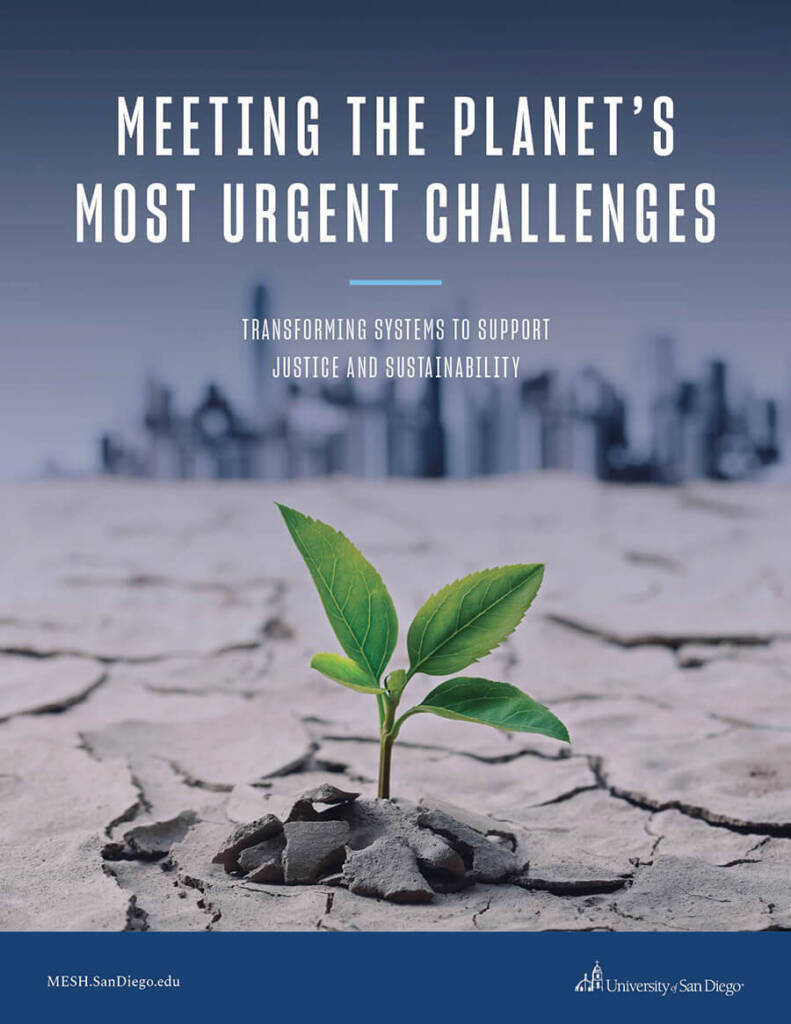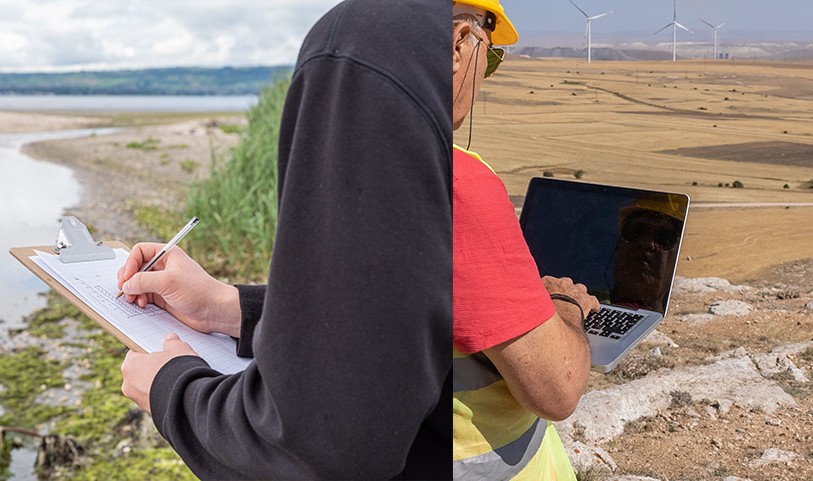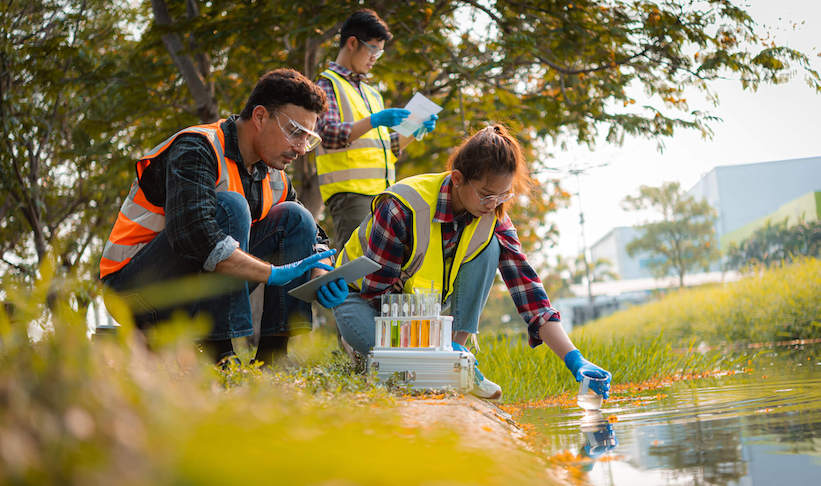As an ever-increasing percentage of the public consider climate change, environmental protection and energy consumption to be major issues that must be addressed, companies and governments are placing more importance on responsible development that can address today’s environmental challenges. The Governance and Accountability Institute’s 2021 Sustainability Reporting in Focus report found that 92% of all the S&P 500 companies chose to release a sustainability report, up from 90% from the previous report, which itself was another year-over-year increase.
Businesses are increasingly recognizing the “triple bottom line” of people, planet and profit, not just out of a need to preserve future generations, but because it makes good sense. McKinsey has found that businesses that act on environmental, social and governance (ESG) concerns generate increased revenue. Better performance in ESG areas also corresponds with lower loan and credit default swap spreads and higher credit ratings.
For those looking to build careers that support this important movement, then environmental engineering is one path at the forefront of just and equitable sustainable development. Read on for how to get into environmental engineering and popular environmental engineering career paths.
What Is Environmental Engineering?
Simply put, environmental engineering is the application of science and engineering principles to solve environmental problems — notably, how societal development can progress while protecting and regenerating our water, air and soil resources. The practice of environmental engineering is broad and, depending on the field works, can employ principles of engineering, biology, chemistry, hydrology, geology, soil science and/or waste management.
What Do Environmental Engineers Do?
The ultimate goal of any environmental engineer is to protect and support the health of both the public and the environment. Exactly how they do so depends on their specific line of work, industry, responsibilities and specializations. Major activities can include:
- Working to reduce, minimize and manage pollution and waste, including air pollution, noise pollution, solid waste, hazardous-waste and waste water.
- Ensuring that all communities have continued access to clean and safe drinking water.
- Designing new technologies that reduce fossil-fuel dependency, promote low-carbon energy production and mitigate the impacts of climate change.
- Keeping companies and organizations aware of and compliant with environmental regulations and public health guidelines.
- Working as a liaison or advisor to federal, state or local agencies to consult on and discuss new environmental laws, regulations and guidelines.
- Monitoring the progress of environmental improvement programs to measure impacts, determine progress and recommend future improvements.
- Advising corporations and government entities on procedures for cleaning up contaminated sites, processing waste and how to effectively recycle.
- Working with interdisciplinary teams to develop innovative, holistic solutions to address environmental and societal issues.
Where Do Environmental Engineers Work?
Data collected by the U.S. Census Bureau indicates that the industries that employ the greatest amount of environmental engineers are:
- Architectural, engineering and related services
- Administration of environmental quality and housing programs
- Management, scientific & technical consulting services
- Water, steam, air-conditioning & irrigation systems
- Sewage treatment facilities
- National security & international affairs
Environmental Engineering Career Outlook & Salaries
f you’re looking to pursue an environmental engineering career, you can expect a median annual salary of $96,820 according to the latest report from the U.S. Bureau of Labor Statistics.
While many environmental engineering career paths lead toward engineering positions in the private sector, others take consulting positions or choose to work in state, federal and local government. Based on the wide range of services that an environmental engineer can provide, the actual job titles and salaries vary and can depend on location and level of experience. In general, these are the most common positions and associated salaries.
Salaries are sourced from glassdoor.com as of June 2022
- Environmental Engineer — In this position, environmental engineers can take on multiple tasks and can be found in a variety of settings, from office settings and construction sites to outdoor areas and projects. They may be expected to travel to conferences and seminars and will consult with urban planners, lawyers, legislators and other engineers.
Average salary of $102,302 USD - Facilities Environmental Engineer — Facilities engineers specifically work in indoor environments such as factories, power stations, hospitals and offices. Those who specialize in environmental management will ensure that the facility meets all environmental, health and safety regulations for operations and waste management.
Average salary of $95,062 USD - Wastewater Project Engineer — These engineers’ prime responsibility is designing and overseeing equipment that receives, cleans and distributes water. They may design or create treatment plants for wastewater and drainage systems for storm water and floodplains, ensuring that water is acceptable for industrial or domestic use.
Average salary of $90,794 USD - Thermal and Environmental Test Engineer — Thermal and environmental test engineers design, maintain and measure systems driven by heat transfer, thermodynamics or similar principles. They conduct thermal and environmental performance tests to promote more efficient heat transfer and energy conversion.
Average salary of $83,582 USD - Civil/Environmental Engineer — These are civil engineers who design with an eye toward the environmental impacts of infrastructure projects. They design, build, supervise, operate and maintain public and private projects and systems that can include roads, dams, tunnels, bridges and energy and water transfer systems.
Average salary of $99,562 USD
A review of listings for environmental engineer positions in the United States across different job hiring sites found openings for positions* in both the public and private sector:
Public Positions
Private Positions
How to Become an Environmental Engineer
Anyone who is interested in how to become an environmental engineer needs to start with a bachelor’s degree in engineering. From there, additional education and experience will make you a more viable candidate for employment.
- The more practical experience a job candidate can accrue, the more capable they’ll appear. For those starting out, look for work experience through internships or cooperative engineering programs. Any work done in an academic setting, a lab or in the field will help to showcase your skills and expertise.
- Consider pursuing an advanced degree if you’re hoping for opportunities in managerial and executive positions or want to specialize in specific areas. A masters in environmental engineering salary tends to be higher than just a bachelor’s, plus a master’s degree can increase your chances of being hired by employers who prefer candidates that hold an advanced degree. Areas of engineering specializations can include:
- Air quality and pollution
- Public health and safety
- Hazardous and solid waste
- Water and wastewater infrastructures
- Environmental development and sustainability
- While licensing is not required for entry level positions, you can (and should) look to supplement your education and experience with professional certification and licensing as part of your environmental engineer training requirements. Make sure to familiarize yourself with the NCEES Principles and Practice of Engineering (PE) exam requirements and fees as well as the licensing requirements of the state you intend to work in.
- As with any professional position, you’ll need to develop relevant soft skills to supplement your professional experience and knowledge:
- Communication is essential for explaining the advantages and benefits of a project, especially to non-engineers.
- Collaboration is required to get anything done, and as an environmental engineer you’ll work with a host of other professionals such as lawyers, legislators, architects and public health officials.
- Project management skills will ensure that projects stay on-task, within budget and address the scope of a problem. They’ll also help you find a way forward when complications arise.
While it’s possible to develop these skills and experiences on your own, finding the right educational program will simplify the process, plus provide the advantage of connecting with peers, making professional contacts and providing access to important resources.
What MESH Offers Environmental Engineers
If you’re an environmental engineer interested in a more holistic approach to environmental issues or are looking for ways to enact truly transformative engineering, then you’re one of the change-makers we’re looking for. The University of San Diego’s Master of Science in Engineering, Sustainability and Health program was created for those who need to innovate new ways of development that goes beyond just sustainability and who want to foster the regeneration and revitalization of our ecosystems.
Engineers alone cannot implement all the changes necessary to enact better solutions. A truly just and sustainable solution takes into account the full lifecycle of a project from its inception through production, implementation, maintenance, and managing the waste/reuse of materials. It needs to be inclusive of the knowledge and expertise of other disciplines and their intersection as well as the local community.
That’s why the MESH program aims to help like-minded professionals come together to address today’s most pressing environmental and social problem by considering elements of community, policy-making and activism. If you want to be able to better communicate and cooperate with other concerned disciplines in designing better solutions for the environment, contact us today.
Resources for Environment Engineers
Looking for more helpful resources to inform your environmental engineering career? Check out these recommended sites.
- National Council of Examiners for Engineering and Surveying (NCEES)
- American Academy of Environmental Engineers and Scientists (AAEES)
- Association of Environmental Engineering & Science Professors (AEESP)
- International Society of Soil Mechanics and Geotechnical Engineering (ISSMGE)
- International Water Association (IWA)
- National Society of Professional Engineers
- American Society of Civil Engineers




